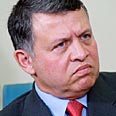
King Abdullah: Without negotiations – high chance of war
Hashemite ruler warns of renewed conflict if progress not made by July deadline. 'If two-state solution not reached, future of Israelis, others will be very bleak,' he says in interview with Chicago Tribune
King Abdullah of Jordan said this week that Hezbollah's activities in Lebanon and the stalled peace process with the Palestinians might lead to war. "In recent years, without progress, we've witnessed two wars in a short period of time.
"There are sources in Lebanon that feel that war is inevitable. The threat of war exists. If we do not bring the Palestinians and Israelis to the negotiations table and if we cross the July deadline – there is a high chance of confrontation. I wouldn't want to meet with you in six or seven months and say I told you so," said Abdullah in a conversation with the Chicago Tribune's editorial board.
The king admitted that he was frustrated from the situation in the Middle East, "I've heard a lot of positive things, but what I've seen on the ground concerns me. As the Jordanian friend of Israel and the Palestinians, I ask the Israeli public; where are they headed?
"I believe that Israel's destiny is to integrate in the area, and not continue being an isolated fortress. This concerns us all. America is also affected by the situation. It is in America's national interest to resolve the situation," he added.
The Hashemite king warned that if a two-state solution is not reached, "the future of the Israelis and others will be very bleak. This is the only solution that can help us all, but if within 10 years we are still talking about it – we will all pay a heavy price."
'Military strike will cause havoc'
The king expressed doubt vis-à-vis the effectiveness of an Israeli strike in Iran. "I spoke with (Prime Minister Benjamin) Netanyahu about Israel's concern over the Iranian threat a year ago. If the Palestinian problem is solved, there will be no need (for) nuclear weapons. If the Palestinian issue is resolved, then why would a country like Iran, which wants a nuclear program under the slogan of the Palestinians and Jerusalem, need nuclear weapons? (It will take Iran a few more years to develop nuclear weapons), and for this not to happen, the peace process between Israel and the Palestinians must be advanced," he said.
"Does Israel have the military capabilities to stop the nuclear program? I have doubts over what an air strike would achieve. An Iranian response would open a Pandora's Box: oil, regional clashes; only negotiations would prevent this...a military strike will cause havoc to us all," he added.
According to Abdullah, a nuclear Iran would spark a regional nuclear arm race. "The last thing we want is that a number of countries develop nuclear weapons," he said.
The Jordanian leader also commented on the disagreement between the "moderate" and "radical" Arab states and said that certain countries are demanding to call-off the Arab peace initiative. He added that if no progress is achieved by July, these calls might become stronger.
"Some are calling to remove the initiative because the dialogue is not working. During the latest Arab summit in Libya, we managed to secure an extension until July and we, the moderate states, will have to answer as to why there is no progress on the Israeli side. If we reach July and there is no progress – we will have a problem," he noted.
The king remarked that certain regional elements do not want peace between Israel and the Palestinians. "There are other elements out there that would like to see war and bloodshed. We must remember that there are those who want war, and war would be a catastrophe."
'Not just embassies for photo-ops'
Regarding the guarantees given to Israel as part of the Arab peace initiative, Abdullah noted that full diplomatic relations will be established, "not just embassies for photo-ops."Fifty seven Muslim states, constituting a third of the United Nations, do not recognize Israel. The Arabs tell Israel: You won't need your walls and fortification, we will guarantee your security, you will be a part of us," he said.
Meanwhile, Jordanian Foreign Minister Nasser Judeh said that his country was concerned over the situation in Jerusalem and that it might "stir up the Arab and Muslim world."
In an interview with al-Arabiya network, Judeh said that "the US' role in the conflict between Israel and the Palestinians is not only required, but is necessary as a power that will pressure both sides to reach an agreement."
Regarding the relations between Israel and Jordan, Judeh said that King Abdullah described them as cold, and said they would remain this way until there is significant progress, which will lead to the establishment of a Palestinian state. Judeh added that negotiations between the two sides were put on hold due to what he called construction in the "settlements."










